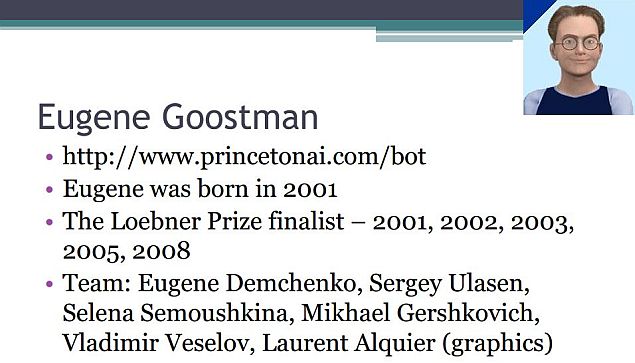- Home
- Science
- Science News
- Chatbot Becomes First Program to Pass the Turing Test
Chatbot Becomes First Program to Pass the Turing Test

A computer program from Russia has become the first to successfully pass the Turing test - a long held measure of machine intelligence. The test is simple - it is a test to see if machine intelligence can be indistinguishable from a human mind.
The Russian program - a chatbot named "Eugene Goostman" - convinced 1 in 3 judges at the Turing Test 2014 competition at the Royal Society in London that it was a real person; according to Eugene's makers, it was the first time this has happened since Turing first proposed the test in 1950.
Alan Turing, the brilliant mathematician, cryptographer, philosopher and computer science pioneer, who was prosecuted for homosexuality in 1952, and committed suicide in 1954, developed the Turing test to answer the question, "Can machines think?" He wrote that since thinking is difficult to define, the question should be "are there imaginable digital computers which would do well in the imitation game?"
The test has, over the years, become highly influential, and also widely criticised, and today, aside from the Turing Test by the Royal Society, there is also the Loebner prize, which takes place in the US, which is also a competition to find an artificial intelligence that can beat the Turing test.
At the Turing Test 2014, "Eugene Goostman" engaged in a series of five minute long text conversations with a panel of judges, and convinced 33 percent of them that it was a real human being. The rules state that anything over 30% is seen as passing, and in fact, in the 2012 Turing Test, "Eugene" had already reached 29%.
There are some caveats though - Eugene is a chatbot, which is giving conversational responses from a prepared script, instead of thinking cognitively about what is being said. Also, Eugene was passed off as a 13-year old non-native-English speaking Ukrainian, so any slips in knowledge or language could be explained as honest mistakes by a real person.
Those are pretty big concessions to make, but despite that, the fact that an experienced panel of judges had difficulty in distinguishing between a person and a computer program is impressive.
IBMhas been working in this field to create something they call the WatsonEngagement Advisor, which can be used to answer customer care queries. This kind of technology could also be used in cybercrime - potentially phishing for information from thousands of customers simultaneously.
If you want to try it out yourself, visit here.
For the latest tech news and reviews, follow Gadgets 360 on X, Facebook, WhatsApp, Threads and Google News. For the latest videos on gadgets and tech, subscribe to our YouTube channel. If you want to know everything about top influencers, follow our in-house Who'sThat360 on Instagram and YouTube.
Related Stories
- Galaxy S24 Series
- MWC 2024
- Apple Vision Pro
- Oneplus 12
- iPhone 14
- Apple iPhone 15
- OnePlus Nord CE 3 Lite 5G
- iPhone 13
- Xiaomi 14 Pro
- Oppo Find N3
- Tecno Spark Go (2023)
- Realme V30
- Best Phones Under 25000
- Samsung Galaxy S24 Series
- Cryptocurrency
- iQoo 12
- Samsung Galaxy S24 Ultra
- Giottus
- Samsung Galaxy Z Flip 5
- Apple 'Scary Fast'
- Housefull 5
- GoPro Hero 12 Black Review
- Invincible Season 2
- JioGlass
- HD Ready TV
- Laptop Under 50000
- Smartwatch Under 10000
- Latest Mobile Phones
- Compare Phones
- Huawei Pura 70 Pro+
- Huawei Pura 70 Ultra
- Tecno Camon 30 Premier 5G
- Motorola Edge 50 Fusion
- Oppo A1i
- Oppo A1s
- Motorola Edge 50 Ultra
- Leica Leitz Phone 3
- Asus ZenBook Duo 2024 (UX8406)
- Dell Inspiron 14 Plus
- Realme Pad 2 Wi-Fi
- Redmi Pad Pro
- Cult Shock X
- Fire-Boltt Oracle
- Samsung Samsung Neo QLED 8K Smart TV QN800D
- Samsung Neo QLED 4K Smart TV (QN90D)
- Sony PlayStation 5 Slim Digital Edition
- Sony PlayStation 5 Slim
- IFB 2 Ton 3 Star Inverter Split AC (CI2432C323G1)
- Daikin 1 Ton 3 Star Inverter Split AC (FTKL35UV16W+RKL35UV16W)
-
 Snapchat to Display Watermark on Images Created Using Snap's Generative AI Tools
Snapchat to Display Watermark on Images Created Using Snap's Generative AI Tools
-
 Wayve Lingo-2 AI Model With Autonomous Driving Capabilities, Ability to Take Passenger Instructions Showcased
Wayve Lingo-2 AI Model With Autonomous Driving Capabilities, Ability to Take Passenger Instructions Showcased
-
 Redmi 13 5G Model Numbers Surface Online; Could Debut in India as Poco M7 Pro 5G
Redmi 13 5G Model Numbers Surface Online; Could Debut in India as Poco M7 Pro 5G
-
 Moto Buds, Moto Buds+ With Dynamic ANC, Hi-Res Audio Launched: Price, Specifications
Moto Buds, Moto Buds+ With Dynamic ANC, Hi-Res Audio Launched: Price, Specifications












